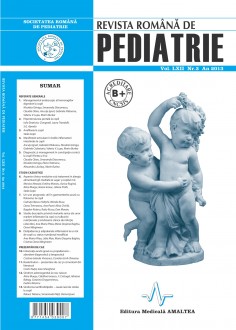SELECT ISSUE

Indexed

| |

|
|
|
| |
|
|
|

|
|
|
|
|
|
|
HIGHLIGHTS
National Awards “Science and Research”
NEW! RJP has announced the annually National Award for "Science and Research" for the best scientific articles published throughout the year in the official journal.
Read the Recommendations for the Conduct, Reporting, Editing, and Publication of Scholarly work in Medical Journals.
The published medical research literature is a global public good. Medical journal editors have a social responsibility to promote global health by publishing, whenever possible, research that furthers health worldwide.
Dyslipidemia and inflammatory adipokines in a group of children with altered nutritional status
Ana-Maria Pitea, Lidia Man, Maria Despina Baghiu and Cristina Oana Mărginean
ABSTRACT
Background. Obesity associates multiple complications, as consequence of chronic inflammation and insulinresistance, changes induced by adipocytes products.
Aim. Determination of serum-levels of inflammation adipokines in obese children and assessment of their relationship with anthropometric and biochemical parameters.
Methods. prospective study including 110 obese children assessed between 1 October 2010-1 March 2013.We determined the leptin levels, adiponectin, interleukins (IL6-8), looking for their correlations with anthropometric and metabolic parameters.
Results. Leptin was 16.79±1.39ng/ml in obese, higher than in control-group (2.78 ± 0.43 ng/ml), while adiponectin was 14871.07 ± 713.17 ng/ml in controls and 9883.49 ± 562.54 ng/ml in obese, with statistically significant differences (p < 0.0001 for both). IL6 and IL8 were also higher in obese group. There were significant correlations between the adipokines and anthropometric indices. Dyslipidemia was found in 20% of obese, 8.18% with increased LDLCholesterol, 26.36% hypertriglyceridemia and 9.09% low HDL-Cholesterol.
Conclusions. inflammatory adipokines are elevated in obese children, correlated with dyslipidemia, and adiponectin decreases, suggesting that marked adiposity in children also can play a role in the pathogenesis of complications.
Key words: adipokines, child, dyslipidemia, obesity, nutritional status
